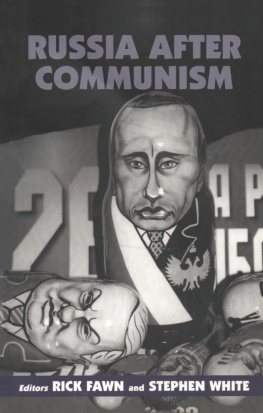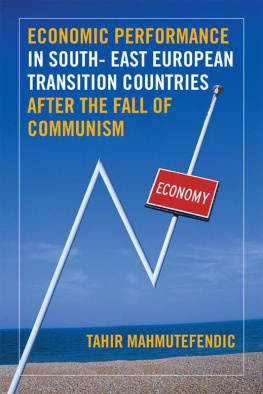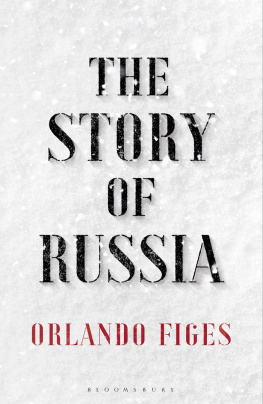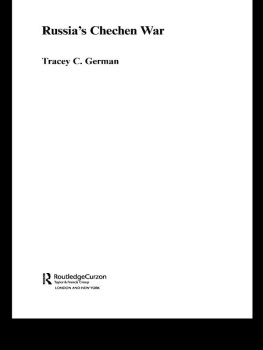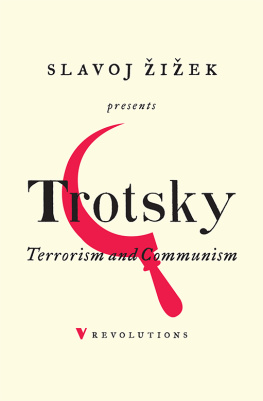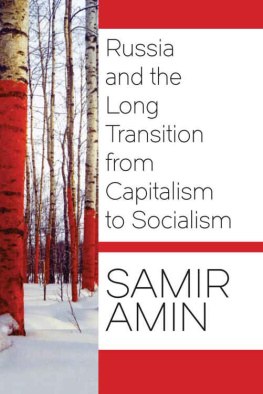RUSSIA AFTER COMMUNISM
Of Related Interest
PARTY POLITICS IN POST-COMMUNIST RUSSIA
edited by John Lwenhardt
BEYOND STALINISM: COMMUNIST POLITICAL EVOLUTION
edited by Ronald J. Hill
THE SOVIET TRANSITION: FROM GORBACHEV TO YELTSIN
edited by Stephen White, Rita di Leo and Ottorino Cappelli
SOCIAL DEMOCRACY IN A POST-COMMUNIST EUROPE
edited by Michael Waller, Bruno Coppieters and Kris Deschouwer
POST-COMMUNISM AND THE MEDIA IN EASTERN EUROPE
edited by Patrick H. ONeil
PARTIES, TRADE UNIONS AND SOCIETY IN EAST-CENTRAL EUROPE
edited by Michael Waller and Martin Myant
GENDER AND IDENTITY IN CENTRAL AND EASTERN EUROPE
edited by Chris Corrin
FORCED MIGRATION IN CENTRAL AND EASTERN EUROPE, 19391950
edited by Alfred J. Rieber
ARMY AND STATE IN POSTCOMMUNIST EUROPE
edited by David Betz and John Lwenhardt
First Published in 2002 in Great Britain by
FRANK CASS PUBLISHERS
This edition published 2015 by Routledge
2 Park Square, Milton Park, Abingdon, Oxon OX14 4RN
Simultaneously published in the USA and Canada by Routledge
711 Third Avenue, New York, NY 10017
Routledge is an imprint of the Taylor & Francis Group, an informa business
Copyright 2002 Frank Cass Publishers
British Library Cataloguing in Publication Data
Russia after communism (Special issue of The Journal of Communist Studies and Transition Politics; v.18, 1 March 2002)
1. Russia (Federation) History 1991 2. Russia (Federation) Politics and government 1991 3. Russia (Federation) Social conditions 1991
I. Fawn, Rick II. White, Stephen
947.086
Library of Congress Cataloging-in-Publication Data
Russia after communism / edited by Rick Fawn and Stephen White.
p. cm.
Includes bibliographical references and index.
ISBN 0-7146-5293-8 (hardback) ISBN 0-7146-8258-6 (pbk.)
1. Russia (Federation) History 1991 2. Post-communism Russia (Federation) I. Fawn, Rick. II. White, Stephen, 1945
DK510.76.R863 2002
947.086dc21
2002004134
This group of studies first appeared in a Special Issue on
Russia After Communism
of The Journal of Communist Studies and Transition Politics (ISSN 1352-3279) 18/1 (March 2002) published by Frank Cass.
All rights reserved. No part of this publication may be reproduced, stored in or introduced into a retrieval system, or transmitted, in any form, or by any means, electronic, mechanical, photocopying, recording, or otherwise, without the prior written permission of the publisher.
ISBN 13: 978-0-7146-8258-7 (pbk)
This collection stems from a conference held at the University of St Andrews in the spring of 2001. We met, in fact, on 17 March 2001, not only St Patricks Day but also the tenth anniversary of the referendum that was to decide the future of the USSR, or even whether it had a future. The referendum recorded a high level of commitment to the continuation of a renewed federation, and indeed there is a very comparable level of regret, ten years later, that some form of union state was not maintained. But a series of developments in Russia and the other republics brought strongly nationalist politicians to the fore, as well as those who, such as Boris Yeltsin, were opposed to the Gorbachev leadership if not necessarily to the continued existence of the USSR itself. The outcome was a series of declarations of sovereignty, and, by the end of the year, the dissolution of the state itself into fifteen independent republics, most of which were linked together in a somewhat nebulous Commonwealth of Independent States.
The papers that form this collection were first presented at the conference, but all have been substantially rewritten for publication in a special issue of The Journal of Communist Studies and Transition Politics and in a separately published book. There is some emphasis upon the process of political change domestically, and in foreign policy. We also give attention to the war that broke out when the Chechen republic sought to establish a fully independent status in a conflict that was still continuing at the end of the decade. Rather more attention, however, is given to the cultural dimension of post-communist change. There are contributions on the media and censorship, and on changes in the Russian language itself. And there are further papers that have a more sociological dimension: on gender, and on religion. Taken as a whole, we hope this is a collection that will do more than cover the events that have taken place in Russias post-communist decade: we hope it will also give some sense of what the decade has meant for Russians themselves, and for their future.
We gratefully acknowledge the support of the British Foreign and Commonwealth Office in helping to make the conference possible; obviously, it should not be held responsible for any of the views that are expressed on these pages.
Rick Fawn
Stephen White
December 2001
RICK FAWN
The September 11 terrorist attacks on the United States gave the Putin administration a decisive opportunity to recast how its military operations against Chechnya were viewed in the West. The Russian governments response to September 11 was to propose RussianWestern co-operation in combating terrorism internationally. President Putin explicitly bracketed the terrorist attacks in the US with those in the Middle East and in Chechnya. The rather clear inference was that these acts were all militant Islamic in origin and presented a common threat to the northern hemisphere. Regardle-s of the sources and nature of international terrorism, the Russian response to Chechen politics has probably been the most striking and difficult aspect in the whole of Russias uneven transition to democracy. A hallmark of this transition is the recognition by all parties of the existing rules of the political game, and therefore the renunciation of other forms of political engagement, including and especially violence. Both sides in the Chechen conflict have, of course, used violence, and both, to different degrees and perhaps for different reasons, have targeted civilians.
While the nature of the response to the attacks of September 11 will almost certainly continue for years, the perception of Chechnya can and does have a variable role in RussianWestern relations. One key organization that has dealt with Moscows prosecution of two wars in the breakaway republic is the Council of Europe. This body considers itself as the antechamber of which any post-communist country must first gain membership in order to be considered for association with or membership of other, more tangibly beneficial, Western institutions. Indeed, among the conditions of entry for Russia into the Council itself was resolution of the dispute over Chechnyas status. While the Council has no financial assistance of its own to offer, it can and does make recommendations to bodies that possess that power. This indirect influence may have some bearing in the Russian context, since Russian media have reported, for example, that the European Bank for Reconstruction and Development, responsible for funding investments, follows recommendations made by the Parliamentary Assembly of the Council of Europe (PACE).1


